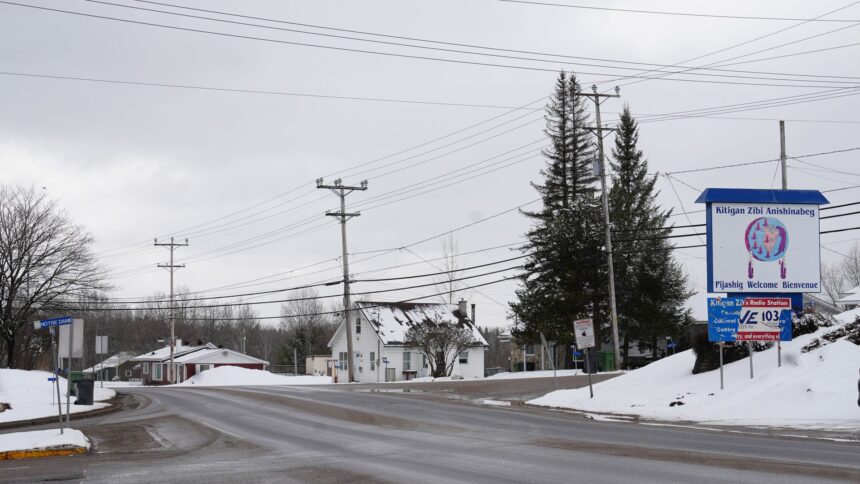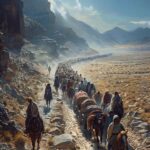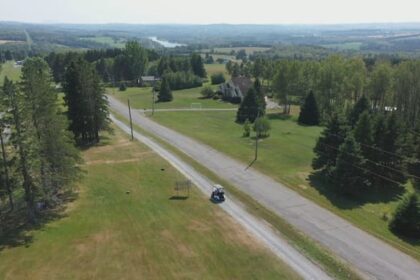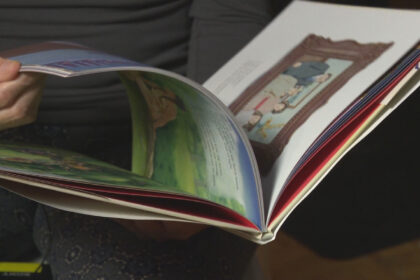Drive a little more than two hours north of Ottawa along Quebec’s winding Hwy 105 and you’ll reach Kitigan Zibi Anishinabeg – a rural Algonquin community that sits along the shores of the picturesque Gatineau River. The late Elder William Commanda is from here. As are Elder Claudette Commanda, the late NHL enforcer Gino Odjick and current Sen. Patrick Brazeau. It’s part of the federal riding of Pontiac-Kitigan Zibi where more than four candidates are vying for the hearts and minds of the eligible voters in the community of 2,300. KZ, as it’s known, is one of many communities across the country that will soon be debating resource extraction and the balance between jobs, the economy and the environment. According to Gestion des titres miniers (GESTIM) there are more than 60 mining claims in ZEC Pontiac, a controlled harvesting zone just west of KZ. There are another 14 claims near Les Quatre-Fourches to the west, and more than 100 claims are spread out like patchwork, along Hwy 105 to the south. “Kitigan Zibi is firmly against mining,” says Kitigan Zibi Chief Jean-Guy Whiteduck, who adds that Algonquin citizens still remember a mine that operated in the area years ago. “It’s very destructive to the land.” Kitigan Zibi Chief Jean-Guy Whiteduck. Photo: Karyn Pugliese/APTN. While mining is provincial, the federal and international context is shifting governments toward pushing for faster development of energy projects and resource extraction. But with U.S. President Donald Trump’s plans to slap “reciprocal tariffs” on Canadian goods with threats to initiate a trade war to create enough economic chaos that would allow him to annex Canada, precious metals and energy resources are at the top of the two federal parties that are leading in the polls. Both Liberals and Conservative leaders are being forced to reimagine trade and exports with new partners, and both have talked about speeding up approvals on resource extraction and big energy projects, including critical mineral extraction and oil. Every province and territory, along with the federal minister of energy and natural resources, called for faster approval processes to meet global demand for critical minerals, like the ones found in the Pontiac-Kitigan Zibi riding, in a joint statement signed March 4. “We are facing the biggest crisis of our lifetimes, and we are going to build our way out of it,” Carney said Monday. When he was later pressed on the issue in during a news conference in Winnipeg, Carney said “when I speak of projects of national interest, when I speak of for example critical mineral extraction, which is a tremendous opportunity for this country, but, can only proceed if there is free, prior and informed consent, only proceed, in my judgement, if there is full participation from First Nations groups.” That same day, Conservative leader Pierre Poilievre pitched a national energy corridor to fast-track approval of key infrastructure. Poilievre says he’ll encourage First Nations to support natural resource projects by “letting companies pay a share of their federal corporate taxes to local First Nations,” a position he first announced last year. But the Pontiac-Kitigan Zibi riding has been pushing for a green economy and preservation. Kitigan Zibi’s Natural Resources and Wildlife Office has been leading a project with municipalities in the area to build a biodiversity project called Kidjīmāninān (our canoe ) that maps, protects and restores ecosystems. Former Kitigan Zibi chief Gilbert Whiteduck on the campaign trail in the community. Photo: Karyn Pugliese/APTN. “Land is the big issue, always in elections,” says former Kitigan Zibi chief Gilbert Whiteduck, who is running for the NDP. Gilbert Whiteduck also spent years working as an Education director for Kitigan Zibi and is involved in land and history conservation projects in the riding. “The big one, as we well know, is about land and to ensure that the land is not invaded because of mining pipelines and that kind of thing without full consultation, accommodation, and some form of reconciliation,” he said. ”You know, climate change, the biodiversity, the protection of the sacred waters are all very important. “And I know there are all kinds of plans about development of that, accessing our indigenous resources on this land without consultation or involvement of indigenous people. So I wanna be a voice.” But Brian Nolan, the Conservative candidate, is worried about the economic health of the riding. This is his run for political office, but says his background as a civil servant, businessman and hemp farmer helped him understand the diverse interests and concerns in the Pontiac riding. One of those concerns is the shrinking lumber industry. He says workers are telling him that the prime wood has been cut and they don’t make the money they used to off lower-grade timber in the region and that Jobs are disappearing. Brian Nolan, left, on the campaign trail in the riding of Pontiac Kitigan Zibi. Photo: submitted. He points to empty stores and areas of poverty in the riding that concern him. Nolan says he fears it will get worse when Trump levies tariffs against lumber. Nolan supports mining as an answer to shore up the economy. “ I’m all for it. I think mining is good. I mean, it’s gonna create jobs, especially in this riding,” he says. “I think we need it. So I think we should go ahead with it.” But Nolan has four caveats. First Nations must be included at the beginning; environmental assessments must be done; water must be protected and the land must be remediated when the mine is eventually tapped out. “I would want to stress that once the mine is over and it’s done let’s say in 50 years – we put down in the contract – that the land that has been used has to go back to normal environment status so that we plant trees and all that stuff, so the land goes back to what it was before.” Sophie Chatel is the Liberal incumbent in the riding which she won handily in 2021 with 40 per cent of the vote. She says she’s been pushing for a green economy and is known for her work preserving Gatineau Park, a 361 square kilometre conservation area run by the National Capital Commission, an agency of the federal government. Sophie Chatel at her campaign headquarters with the Minister of Jobs and Families Steve MacKinnon. Photo: Karyn Pugliese/APTN. She has also worked with Kitigan Zibi on its biodiversity project. “Conservation is a sector of prosperity for the community as well,” says Chatel, “because we need nature. It has value.” Chatel says she’s met with the forestry association and agrees that tariffs are likely to hurt the lumber operations in the area and in turn, will impact employment. Long-term, Chatel sees the development of green jobs like ecotourism as a solution. For now Chatel knows her party wants to speed up mining and resource extraction projects, but at the same time says, “we have to speed up nature protection as well.” For Chatel, mining could be an opportunity to support green spaces through ideas like “nature bonds” which ensure that the regulatory authority has enough money set aside to reclaim the site. “If they (mining companies) create damage at one place, they have to make sure that the hotspots of biodiversity are not only protected, but that we have the resources to protect it,” she says, “And so the private sector can invest – like let’s say a mining company is creating damage, it has to repay by protecting nature.” KZ has never ceded its land – and the entire federal riding sits on an unresolved comprehensive land claim for the Algonquin Nation. Signs posted by the Coalition Against Mining Activity in Low, Quebec. Photo: Karyn Pugliese/APTN. About 90 minutes south of KZ sits the community of Low with a warning of what could be on the horizon. The small community on the shores of the Gatineau River is named after Charles Low – a lumber merchant. With its scenic spots along the river, the outskirts of town are dotted with farms that sit on the northern edge of Gatineau Park. Low, with a population of 1,000, is in the local news for a reason other than timber. In January 2024, two citizens of Low, whose economy relies mostly on tourism and farming, discovered claims on their land by the mining companies Brunswick Exploration and Lomiko Metal. They alerted others in the town and found that the companies hold 3,000 acres or about 20 per cent of the land which is rich in graphite, the main component of the batteries that power electric vehicles. The majority of claims were all staked in the past few years, after the federal government courted electric vehicle manufacturers to set up plants in Canada and wooed them with tax breaks and other incentives. Carolyn Raab is a non-Indigenous farmer in Low, who found out mines had placed two claims on her farm and was rattled that her land could be claimed without her knowledge or consent. She and other members of the township formed a citizen’s group, Action Low, to pressure the municipality and the regional county municipality (RCM) to signal to the province that mining is not welcome in the town. However, the town has no legal option to stop the mine and the RCM can only make suggestions. The province will ultimately decide if mining permits go ahead, or not. “This mining act puts mining and claims and the mining companies pretty well ahead of every other department or agency in the Quebec government,” says Raab. “You know, it has the most power of everything and so, you do see these, these mines being pushed through where the governments will say, oh, you know, we have all these checks and balances in place and we don’t do it unless there’s a level of social acceptability.” A map outlining the mining claims in and around Low, Quebec. A speculator filed all the claims for $25 then sold them to junior mining companies. Map courtesy Gestion des titres miniers (GESTIM). Some of the claims in Pontiac-Kitigan Zibi may be speculators who may never develop the land. In Low, the companies have only done preliminary aerial surveys, says Raab, noting it could still be a few years before the companies do any exploration or extraction. If development does go ahead on unceded Algonquin land, it will be hard to stop, admits Chief Whiteduck. The most the community may hope for is to influence how it is done and try to minimize the environmental impact. The riding went NDP once during the “Orange Crush” election of 2011, when the party won a historic 103 seats. Whiteduck appears to be the first Indigenous candidate to run in the riding. The Conservatives won the riding before 2011, and historically, it has flipped back and forth between Liberals and Conservatives. Chatel’s predecessor won twice for the Liberals meaning the riding has been red since 2015. While Indigenous voters make up only a small portion of the population, about eight per cent, they could swing the election in a close race. Continue Reading
Mining versus a green economy is a question Kitigan Zibi voters will answer in federal election

Leave a Comment










